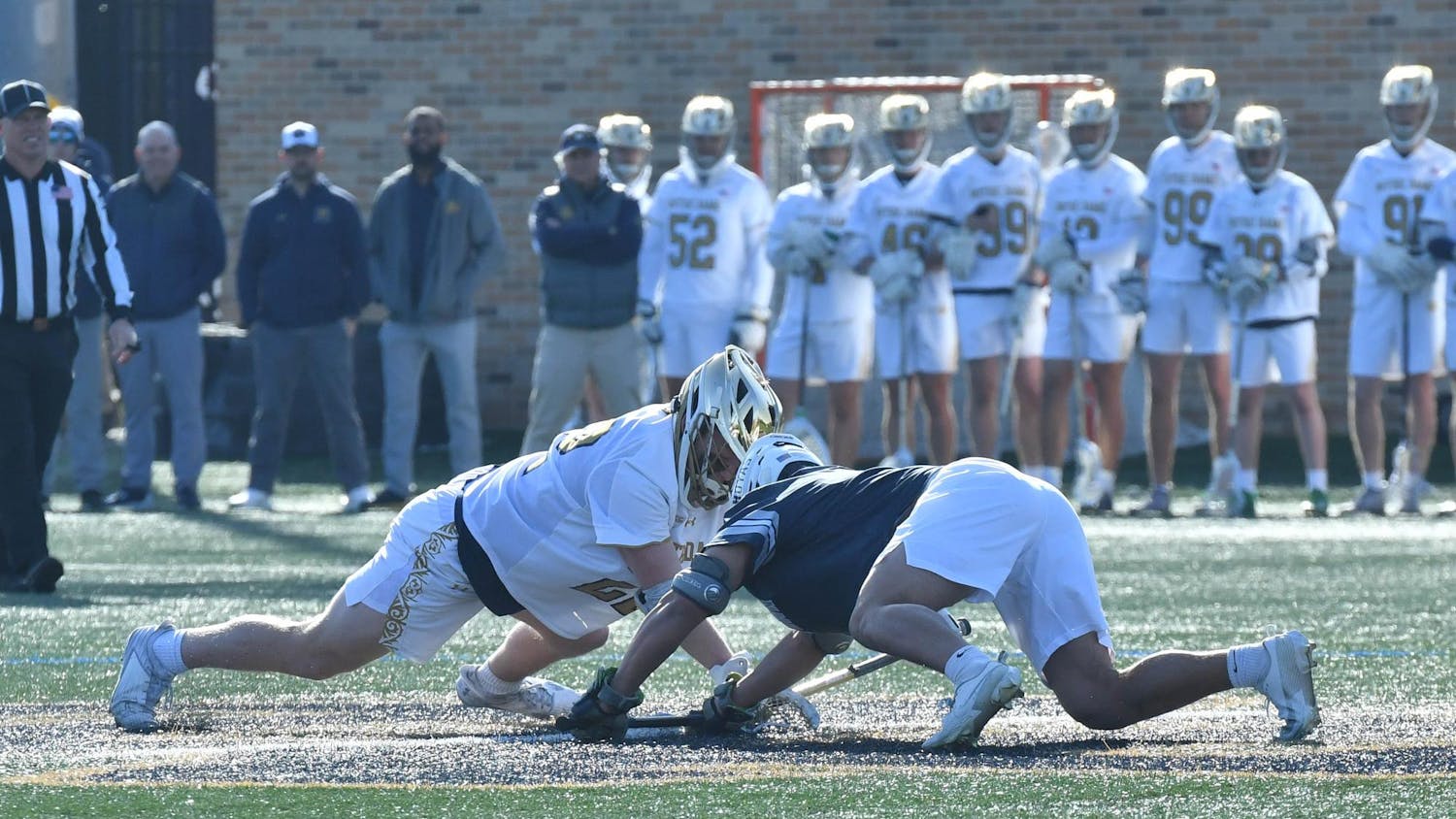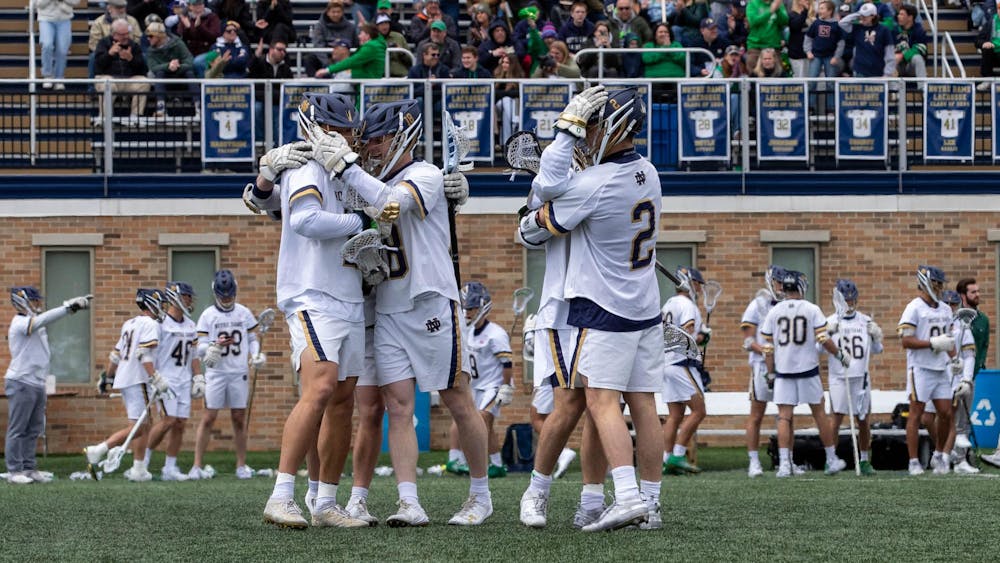In 1970, Dave Casper was a freshman at Notre Dame. He was pushed around in practice, simply "meat" for the upperclassmen and trying to survive.
But he did get something that lasted a lifetime his freshman year - his nickname: The Ghost.

"Denny Murphy started called me 'The Ghost' when I was on the freshman team and he was the freshman coach," Casper said in a phone interview with The Observer. "I didn't really care, I just wanted to get through practice every day without dying."
Casper did more than survive his freshman season. In his football career, he earned All-American honors, won a national championship, went to five Pro Bowls, won two Super Bowls and has been inducted into both the Pro Football Hall of Fame and the College Football Hall of Fame.
The Chilton, Wisc., native played offensive tackle for his first two seasons with the Irish because of injuries at the position. Casper was so athletic that he started at tackle one week before playing receiver the next.
"I never saw myself playing much," Casper said. "It just so happened they were short of offensive tackles. So my sophomore year, I was a small offensive tackle that had to play because of a thin offensive line and injuries. My junior year, I was a bigger offensive tackle. My senior year, the tight ends got hurt so they moved me to tight end in the spring and they never moved me back."
As a young offensive player, Casper said he did not envision his career the way it unfolded.
"I probably didn't even think the pros were possible at the time," Casper said. "I was hoping to be of value my junior and my senior year, maybe I was going to get big enough to contribute. I never really thought much about whether I was going to start or anything. I showed up, did what they told me to do and things worked out."

Casper was named an All-American in 1973, when the Irish won a national championship under former coach Ara Parseghian. In his collegiate career, he totaled 21 catches for 335 yards and four touchdowns in a primarily running offense.
The 6-foot-3 tight end said Parseghian was an easy coach to play for during his career.
"You went to practice, did what he told you to do and we would win football games," Casper said. "He had a great understanding of the game and he ran a tight ship. Everything we did meant something. If you couldn't play for coach Parseghian, you're probably just trying to cause trouble because it wasn't very hard to play for him."
The Oakland Raiders selected Casper in the second round of the 1974 NFL Draft. Casper credits the Raiders coaching for turning him into a Hall of Famer.
"I learned a lot going to the pros working with the Oakland Raiders and Fred Biletnikoff," Casper said. "I always had a lot of speed and I could always catch so once I got to the pros, I was fortunate enough to be taught some good skill sets and play on a great team."
The Raiders, who won Super Bowls XI and XV, had a reputation as being one of the toughest teams in the NFL during the 1970s but Casper shrugged off any notion of it.
"Every team was tough," Casper said. "College was tough. Everything was tough. Football is a tough game, it always was a tough game."
Casper was a key figure in a couple iconic NFL moments - 'The Ghost to the Post' and 'The Holy Roller' - but he said his greatest trait was being in the right place at the right time.
"Most of the time, you're just plain there," he said. "On 'The Ghost to the Post,' I ran a pattern, they had to throw it to me because they needed to get over 20 yards and I was going deep. I looked over my left shoulder and realized Snake (Ken Stabler) had to throw it way over to the right. I put my head down, changed directions, looked up and the ball was there. Once the ball was there, it's easy, you just catch it. Most people can catch a pass. Getting to the pass is sometimes difficult.
"On 'The Holy Roller,' I just happened to be the guy at the end that was there when the ball came. I just saw this ball coming at me, tried to pick it up. I didn't pick it up, I kicked it forward to myself and finally fell on the ball. My greatest skill set was I just happened to be there at the time."
He finished his NFL career with 378 receptions for 5,216 yards and 52 touchdowns.
Casper, 61, was inducted into the Pro Football Hall of Fame in 2002 and the College Football Hall of Fame this year. The Economics major has been a financial advisor at Northwestern Mutual for 25 years, dealing with retirement planning.
"They remind [me] a lot of Notre Dame; they're a high-value company," Casper said. "They work on long-term integrity. It's a great fit for me because it reminds me of a lot of the value Notre Dame had, which was taking care of people and doing the right thing."
Casper related economics to his current job and said it can even be applied to football.
"Anytime you try to decide where to put resources, what to do, how hard to do it, it's economics," Casper said. "It even works in football. Should you spend time in the weight room? Should you spend time in practice? Should you spend time resting? Where are you going to get your bang for your buck?"
Casper said Notre Dame prepared him well for life after football.
"Notre Dame teaches you both knowledge and wisdom," Casper said. "A lot of teaching at Notre Dame isn't necessarily the professors or the college, it's the students you're with. The people you're around taught you a lot.
"I wouldn't say Notre Dame changes a person into a great person because they went to Notre Dame. I think great people can see the value of Notre Dame and simply choose to go there. Notre Dame has been very fortunate that some great people have decided to go to Notre Dame."
Casper described his Notre Dame experience as a special one, surrounded by superb people.
"I was in a great place with great people," Casper said. "How could that not be great being at an institution whose purpose is to preach Jesus Christ and be around people that care about other people? At the same time, I was able to play football and beat Southern Cal."
Casper is married to his wife Susan and currently lives in Alamo, Calif. He has three children, four step-grandchildren and is expecting a third grandchild.
Contact Matthew DeFranks at mdefrank@nd.edu












